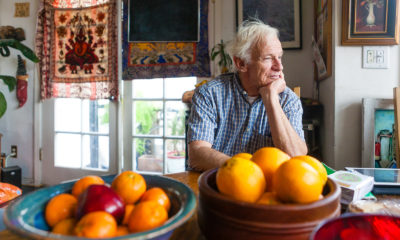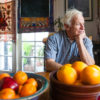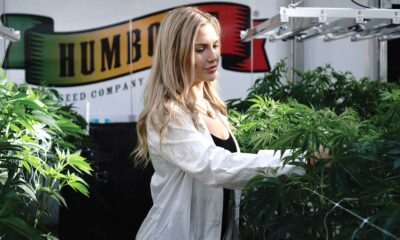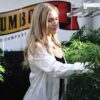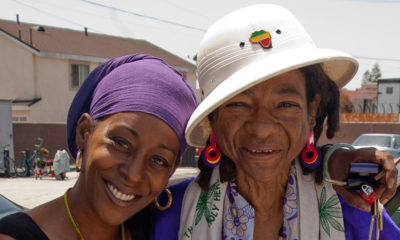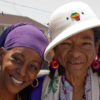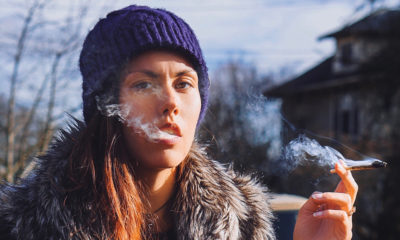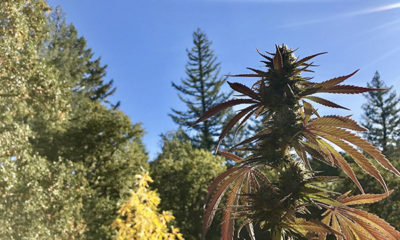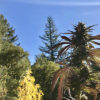
Joint Opinions
The Melissa Etheridge Interview: This Is M.E.
Melissa Etheridge is known around the globe as a songwriting musician who’s earned all the badges of celebrity honor. With two Grammys, millions of albums sold and a star on the Hollywood Walk of Fame, she’s achieved a type of luminary status that generally comes with a team of PR specialists warning against saying the wrong thing and causing a media frenzy that tarnishes an otherwise solid-gold image – like advocating for cannabis.
But Etheridge isn’t one to let stigmas stop her. In September, she was the keynote speaker at the Cannabis World Congress and Business Expo in Los Angeles — the nexus of high finance and the burgeoning marijuana economy — where her affability, intelligence and personal connection won over the crowd and inked yet another glowing line on her already impressive curriculum vitae: cannabis activist.
Her message is straight forward. Cannabis should be legalized and the people who enjoy it should not be defined solely by the act of using cannabis. They are average people like yourself — your neighbors, family members and friends. They are doctors, lawyers, teachers and assembly-line workers who want their cannabis use to be just a part of who they are without being judged. Now, she’s ready to step out into the spotlight – again – for cannabis, regardless of what people may think. Maybe it’s because she’s been through some incredibly difficult times in her life — like being a popular entertainer coming out to, literally, the whole world as gay. Maybe it’s a strength derived from surviving breast cancer and the brutal chemotherapy that followed. Or, maybe it’s just who she is: a nice girl from a middle-class family in Leavenworth, Kansas, who worked hard, made good and now wants to do right and offer the truth about her positive experiences with marijuana.
Cannabis Now Magazine caught up with Etheridge recently while on her “This is M.E.” tour throughout the U.S. to get her take on the state of cannabis and where she thinks it’s all heading.
CNM: You’ve half-joked before that you wasted your early rock stardom years not abusing drugs or alcohol.
Melissa Etheridge: When I first started out I was playing in country and western bands. I was in high school and I would play these bars — ya know, these honky tonks. I would see people drinking and drinking and by the fourth set, like 1 o’clock in the morning, they were all wasted. It was ugly. They were not pretty. So, drinking held absolutely no mystery for me, whatsoever.
Were your parents supportive of your musical pursuits then?
My mother had a hard time with it. She thought that was no life for me, being in bars. But my father went, “Yeah, we’re doing it,” so we kinda did it anyway. And later, I went to music school in Boston. As long as I was self-sufficient, they said they were not going to complain. So, I just played in pianos bars and paid the rent — so they couldn’t complain.
When was the first time you experienced cannabis?
I was a junior in high school. This girl who sat behind me, she was really nice but she hung out with the stoner crowd— the kids that were at the side of the building smoking or something. I had a girlfriend — and, of course, I wasn’t out then – and she was like, “Let’s try some pot.” I thought, “Well, I don’t know how to get it but I can try with this girl I knew.” By the way, that’s how easy it is in high school, people— and this is Kansas in 1978! So, she brings me a nug and I don’t know what to do with it! I had no idea, ‘cause I’d never seen weed before in my life. We got rolling papers and went and parked somewhere. There was no internet back then to help you figure it out, so we tried our best but nothing really happened.
After that – while in college in Boston or right after I’d quit college – I was walking home and one of the gals I worked with said, “Hey, you wanna have a smoke?” So, we sat on a stoop somewhere and had a smoke and it was just so delightful. Just really delightful. Every experience I’ve ever had with it has been great. I didn’t pursue it and think, ‘This has to be in my life.” It was just casual and when it came along, I enjoyed it.
The War on Drugs was raging hard in the late ’70s and ’80s, right?
Yeah, it really was. A lot of people in our generation always knew that pot was harmless – I mean, anytime I ever mention pot to people, they giggle. It’s that thing that makes you giggle and have fun and talk about the meaning of life.
Did you buy the prevailing message back then that cannabis was a gateway drug to harder substances?
That message was really drilled into us in the ’80s and it still prevails today. They’d say if you do pot, you’re going to want to do something else. Yes, there are heroin users who first started smoking pot but soon their problems — and the things that drive a person— led them to shoot heroin. Pot is not enough to take care of that, so they move on. You can’t call that a gateway drug. That’s like saying that cigarettes are a gateway. You can say that about anything — drinking is a gateway. You can say sugar is a gateway. This is a person-by-person basis thing that our society is going to have to look at soon.
You’ve said that the cannabis movement is a lot like the LGBT (lesbian, gay, bisexual, and transgender) movement over the past couple of decades. Do you think it’s about dispelling fear of the unknown?
Completely. This is so similar to where we were 20 years ago with the LGBT movement. What it’s going to take is people coming out. Other people who don’t have cannabis in their lives just need to see people who partake in cannabis. It’s part of their lives and they have jobs and families and they live down the street from you. They’re perfectly fine contributing citizens. That’s what it took in the gay community.
It’s about normalizing cannabis use, maybe getting people to see that it’s just another enjoyable aspect of life.
Yes. It would really help if that happened. That’s why legalization is so important. There are people that would use it, but just don’t want to break the law. There are a lot of really good people out there who don’t want to break the law, but they believe that cannabis could help them.
I think a fear for some people may also be that Child Protective Services (CPS) comes knocking on their doors. Like the stories you hear about people in prohibition states with sick children who might benefit from cannabis treatments. Have you experienced that type of anxiety?
Yes, I have in a way. It’s funny, because the CPS workers who do it—everybody knows that cannabis is fine. It’s just like, well, this is the protocol. It reminds me when I had my first child. My partner had a child and we lived together. It was hers and mine, there was no doubt about it that we were growing this child together and it’s ours. And I had to adopt the child, but back in 1997 same sex couples couldn’t adopt.
So, I had to go through the social worker coming out to look at me and looking at the house and then denying me my right to adopt my child. Then we had to take it to a judge to overturn it. And we found this one judge, the way to do it. The people who carry out these rules know that it is not right, it’s just the way the rules are written. And that’s the same thing in a lot of these CPS [situations]. They’re like, some day it won’t be like this, but right now this is protocol and this is what I have to do.
When did cannabis really become a part of your life?
Cannabis came into my life the year before I was diagnosed with breast cancer. My wife and I, at the time, found it to be very helpful for anxiety. When I was diagnosed I went, “Okay, this is something I need to do every day now just to be normal.” It so helped me.
It really hit me over the head then that I can’t be okay with “I’m a cannabis user and I get away with it because I’m in California and everybody smokes here.” The laws need to change. This is something good, especially for people on chemotherapy. I don’t know how anybody would do chemotherapy and then take five other drugs for the side effects — and the side effects of that. It’s just horrendous. Cannabis really helped me. So, I fight for the medicinal side, as well as recreational legalization. I mean, recreational is what we need — but there’s so much need for medicinal. We’re still finding out what it can do, because for so long we haven’t been able to research it.
There’s very little peer-to-peer medical review happening in the U.S.
Right. I’m working with some physicians and trying to help change that.
Are you doing that with the National Cancer Association?
Not a national one — not yet. It’s with one in California. I think California is going to be the leader in that. This state really understands the importance of the medicinal side of this. Talking with people who are trying to bring recreational about but they want to still keep medical important. You know, with Colorado and Washington, medical kind of got pushed to the side because recreational overtook it. I think there’s a balance that’s going to happen.
Why do you feel recreational is important, too?
When you legalize it, maybe there are people who say, “Ya know, I’ve been drinking a lot this week. I think I’m gonna try cannabis.” And they can do it, because it’s legal. And it does so much for the states [that legalize]. Drunk driving goes down, fights happen less…I think it’s all medical use — we’re just going to find different ways of saying it.
You’re part owner of a cannabis dispensary in Santa Cruz, right?
Yes, the Greenway Collective. It was the first legal medical dispensary to open in California. It’s through there that my cannabis wine was made.
What’s that wine like?
This is something that for years has been made on the side, particularly up in the California vineyards. It’s an old tradition. They’ve found clay pots from Biblical times that have cannabis and wine in the residue. This was something that was done a long time ago, the infusion of herbs in wine. And winemakers have been doing it on the side since then. Someone brought me a bottle, and I was like, Wait, this is amazing! So we started selling it at Greenway as a tincture — which a tincture is an alcohol-based medicine. So, we used it as a wine. We can sell it legally as a tincture in California through our dispensary.
How does the cold-pressing work?
For THC to be released, cannabis has to be heated up, but that heat destroys the wine. You can’t heat up wine. Most alcohol products on the market are heated up in some way. With this, it’s infused during fermentation. So, you get these CBDs, which of course gives you more of the body relaxation. It’s not like edibles where when you eat them you get that psychotropic effect. You don’t get that. You get what you feel when you have a glass of wine — this extra stress release, full-body high.
That sounds nice.
Yeah, a lot of people prefer that. It’s a beautiful middle ground between wine and cannabis. We’re currently working very hard to get the distribution to get it out there to the world and we’re very close.
You told friends of yours some time ago that one day you’d be the face of cannabis and you said they all laughed. Why do you think they laughed?
Yeah, everybody laughed. It’s the funniest thing that people laugh about cannabis. And I’d go, “Okay, you’ll see what I mean.” Just like the LGBT movement, it’s important to have a face to it. I would love more than anything for a housewife in California to go, “Ya know what, Melissa does this. Maybe this is okay. Maybe I stop having my six pack of beer every night and I can use this.” It’s a just a lot healthier. I think that’s the future — people thinking more about their health and using cannabis.
You’re so much the celebrity face of cannabis right now that the Cannabis World Congress and Business Expo asked you to be the keynote speaker at their conference. How was that?
The Coalition for Access Now asked me to represent them at the expo and asked would I speak and I said absolutely. I feel so passionately about this. This is a movement, this is the future. We are at the cutting edge of this and it’s weird and awkward and scary — but there’s safety in numbers.
Do you ever take a toke before a performance?
Good Lord, of course! Let’s say I’m doing a show and I’ve done it for a while and I have it down with my band — like I know these songs and they know them — I will take a hit or two right before I go on. That’s really fun. I do really have to know what’s going on, ‘cause that little lapse of memory that you can get when you’re doing that can sort of trip you up. But I do enjoy it.
How did you come up with that great cover for your latest album, “This Is M.E.”?
We wanted to let fans know a new album was coming and wanted to get them involved. So we thought, Why don’t we have them all send in pictures of themselves and we can create a mosaic. Maybe we can do a mosaic of me with all of their faces — a little bit of them and a little bit of me.
You grew up in Leavenworth, Kansas, which for some people might bring to mind serious federal penitentiaries like Folsom and Attica. There’s a big prison there, right?
Yes, it’s huge. It was about four or five blocks from my house. It’s this massive, sprawling space and this big, big building. We drove by it all the time. Every now and then there’d be a prison break, but whenever the prisoners escaped they always ran out of town, they never bothered us. There was a prison riot once and I had a friend who lost her father who worked as a guard there. The prison was a big part of the town.
Our country has a terrible history of sentencing non-violent drug offenders to long, brutal prison terms. Have you worked on behalf of prisoners at all?
Just yesterday I was at the Ohio Reformatory for Women. I did a performance there. They have a [drug and alcohol recovery] program there to do with music. I really feel we are at the beginning of a change in our society where we’re going to stop punishing people for using drugs or for being a drug addict and we’re going to start understanding the part of us that is susceptible to this. And we’re going to draw a distinction between plant medicines and pharmaceuticals, that they are two separate things and that plant medicines can actually help and heal. Especially with people who are addicted to pharmaceuticals. This is in the very near future.
The whole cannabis movement — legalization in more states and federal rescheduling – will lead to research that starts to prove this and moves our society away from the cliff that we’re jumping off of with pharmaceuticals. We need to get back to understanding what health is. When that happens, our prison system will change, the whole way we punish people will change.
Do you think California will vote to legalize in 2016?
Beyond a doubt. I think we were all surprised when it didn’t pass. I think now people know what a great business it is. It’s California’s number one agricultural crop. California will be the leader in this — already people know Cali weed is the best.
What are your thoughts on the federal government someday legalizing cannabis?
I would sure love to see President Obama do something on the way out, but I don’t know if he wants that. The 2016 [vote outcomes] will make a big difference. I think that it will probably be done in steps, like starting with scheduling. It’s like the gay thing — it’s a long road, but it’s just one step at a time.
Do you think the next president will be a democrat or republican?
Oh god, please, it’s gotta be a democrat. It’s funny, democrat or republican, big business still runs our government. But socially and representatively, I just can’t see anybody on the republican side that can do it right now.
Are you public yet about who you’re voting for in 2016?
I’m not public yet. I sure love what Bernie Sanders is saying. I don’t have a gripe with Hillary. She’s able to say, “I made a mistake and I feel differently now.” She’d be a fine president.
Do you have anything else you’d like to convey to our readers?
Yes, it’s a message of believing in yourself. It’s about not having any shame about enjoying plant medicine that has been around for thousands of years. There’s nothing to be ashamed of. So, put your head up and come out.
Published in issue 18 of Cannabis Now. ON SALE NOW! Click here to purchase.





